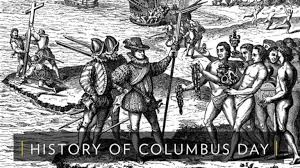The History, Meaning, and Controversy of Columbus Day
Many young American pupils are taught the rhyme “In 1492 Columbus sailed the ocean blue” to help them recall the year that the Italian explorer Christopher Columbus arrived in the Americas.
Columbus Day is held to honor the Italian explorer’s voyage to the Americas, which arrived on October 12, 1492. Numerous Americans observe the holiday, which is observed on the second Monday in October. Although it is said that the guy who “sailed the ocean blue” is credited with “discovering” the Americas, both this feat and the celebration that honors it are shrouded in debate.
Christopher Columbus: Who was he?
Italian adventurer Christopher Columbus, also known as Cristoforo Colombo or Cristóbal Colón, was born in Genoa in 1451. At the age of 14, he learned to sail, and he took part in numerous trading expeditions around Europe. He set off for Spain in 1485 in an effort to raise money for an expedition to investigate the western trade routes. Columbus pleaded with King Ferdinand and Queen Isabella of Spain for eight years to provide him with the ships and funds he needed to complete this expedition. Columbus pledged to explore Asia, return with silk, spices, and riches for the Spanish throne, and establish Christianity throughout these remote regions. Eventually, they decided to provide the funding, and on August 3, 1492, Columbus set off from Spain with his fleet of three ships—the Nina, the Pinta, and the Santa Maria. They sighted land after a torturous five weeks, which was far longer than he had imagined. Instead of Asia, the modern-day islands of Cuba and Hispaniola were where Columbus and his crew first set foot.

300 years after Christopher Columbus first set foot in the Americas, the first commemoration of Columbus Day was held in New York City in 1792. Franklin Delano Roosevelt, the president of the United States, declared October 12th to be Columbus Day in 1934, designating it as a national holiday. Then, in 1971, it was altered to fall on the second Monday of October.
How is it honored?
The landing of Columbus in the Americas is a powerful representation of Italian heritage. On this day, a lot of Italian-Americans have street fairs and parades to honor their history. Native organizations also utilize the day to celebrate the native Americans. The occasion is taken advantage of to educate people about Native American history and culture, which many believe were harmed by the arrival of Christopher Columbus. All banks, post offices, and government offices are closed in commemoration of this day, and numerous businesses and schools are also closed.
A disagreement with the holiday
A lot of people are against Columbus Day and what it stands for. Columbus’ expedition’s main objectives were to find treasure and conquer and exploit new areas. Although numerous indigenous groups had already established themselves in the Americas when Columbus came, his intention was to plunder the continent for wealth regardless of any opposition. The locals were abused by Columbus and his troops, who also employed enslavement and violence to achieve their goals. They also spread a number of diseases among the locals and coerced Indians into becoming Christians. Many Americans contend that Columbus shouldn’t be honored for bringing disease and disaster to the Americas because these new diseases will ultimately wipe off entire communities.
Additionally, Columbus transported several dead Taino Indians from the island of Hispaniola to Spain in order to sell thousands of their peaceful people. To assist the invaders, the native people was compelled to mine for gold and harvest the land. Only a small number of the Tainos, who may have numbered around 250,000 at the time of Columbus’ arrival, remained on their island within 60 years. The Intercontinental Gathering of Indigenous People in the Americas, an association of more than 350 indigenous groups worldwide, has referred to the day as the International Day of Solidarity with Indigenous People since it was established on October 12, 1992.
Because Columbus did not genuinely find the Americas, some individuals are against the celebration. A section of North America had already been explored by Norse explorers. In actuality, Leif Ericson is said to have been the first European to travel to the region. He established a colony in Newfoundland, Canada, about 500 years before the arrival of Christopher Columbus, according to historical records. Others contend that since the Americas were already populated, there was nothing to “discover” in the first place.
The teaching of Columbus and his trip has frequently been attempted to be removed from school curricula. Some people advocate renaming the federal holiday or doing away with it altogether. Regardless of how you feel about Christopher Columbus or Columbus Day, it is undeniable that the holiday is a great opportunity to learn more about the Age of Exploration and, particularly, to honor the history and culture of the United States and its native populations.
